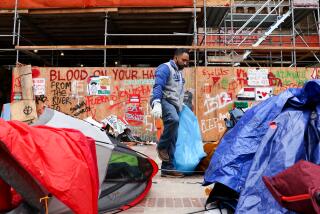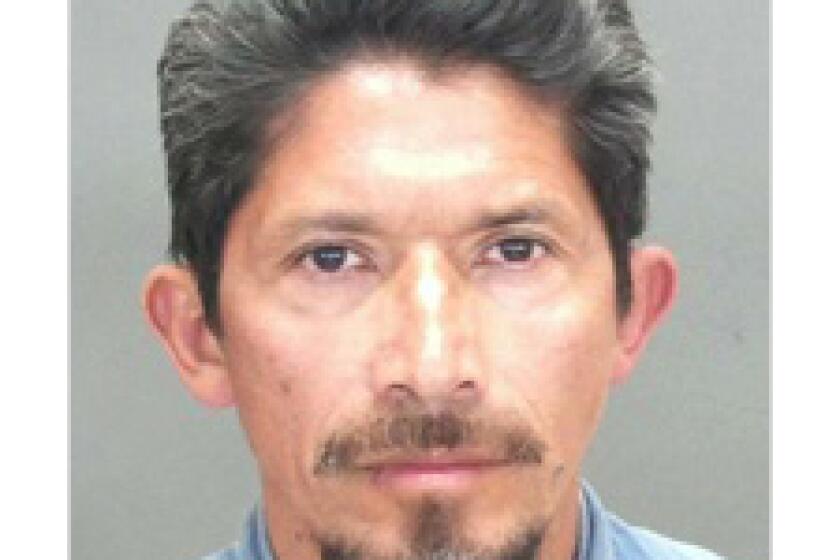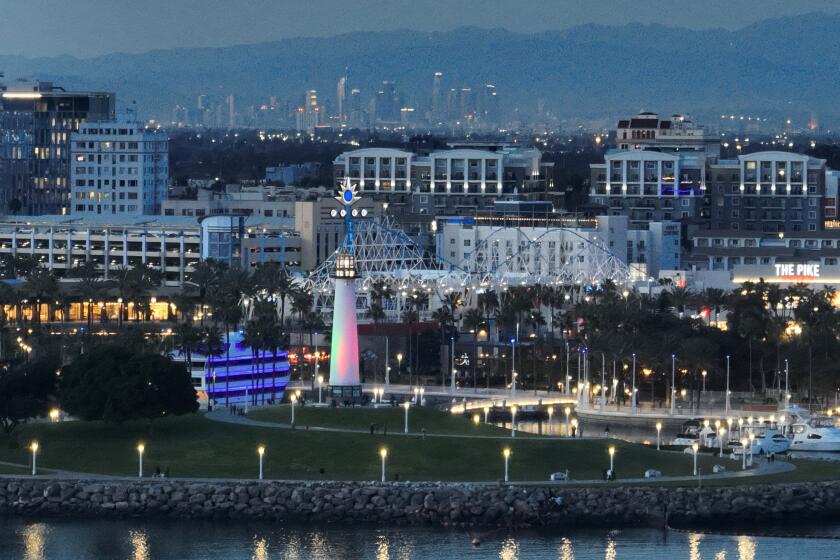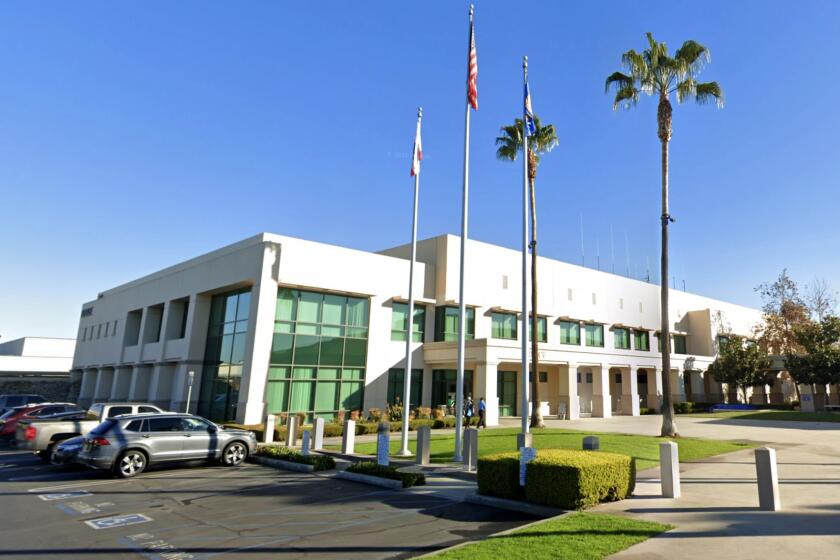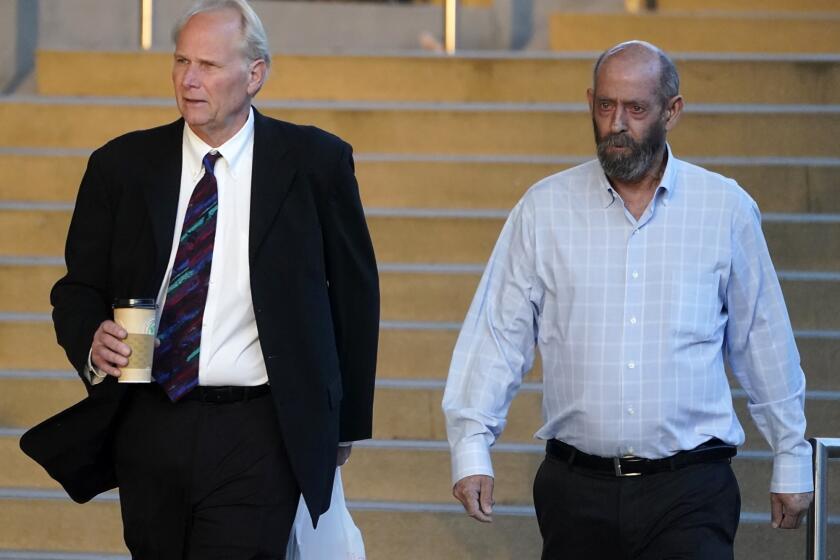Father, Son Turn Lives Around in Family Business
Big Hector Marroquin still looks like the widely feared gang leader he once was. Tattoos spiral up his big arms and across his chest and a heavy gold chain hangs at his neck. His head gleams bald above a lush, chestnut goatee and a cross dangles from a pierced eyebrow. Black Ray-Bans rest on his forehead. He looks like a man who is used to being obeyed.
He turned his life around long ago by becoming a roofer, building his own company and becoming a man of peace. By the mid-1990s, law enforcement officers, ministers and a state senator were seeking him out to negotiate gang truces from Lennox to Santa Monica.
But for all his wide influence on the streets, the one person Big Hector couldn’t seem to reform was his own son.
Early on, Hector Sr., now 48, had set an example for Hector Jr., who followed, step by step, into gangs, into trouble, into danger. “See, when I was growing up I didn’t have anyone to give me advice or tell me right from wrong,” Big Hector said. “So even though I was there for my family, I really wasn’t there. I was always working. But a boy needs a man.”
Hector Sr. never knew his father. He was 14 when he came home one day and found his family gone. His mother, brother, sister and his mother’s boyfriend had moved out of their Cudahy apartment while he was in school. “I didn’t know what had happened. I just started crying and the manager told me I had one more week.”
Homeless, he would find a Laundromat, put a dime in a dryer and prop open the door to stay warm while sleeping. Sometimes he would pretend to fall asleep at friends’ homes, hoping they wouldn’t wake him to leave.
So he built a new family on the streets. “I didn’t want to be alone, so I would get as many guys as I could to hang out all night with me.” The band of angry boys he gathered would morph into the 18th Street gang.
“I hated the world. I hated people. I was jealous of everyone,” he said. “I would start beating up some guy and I’d start thinking of my mom, and even when they were down and unconscious, I’d beat them and beat them until my homies would pull me off.”
Big Hector chokes up and turns his head away. He has long forgiven his mother, and now they are close.
Hector Sr. married at 16. Hector Jr. arrived two years later. The new father never had a job, and didn’t know many men with real jobs either. But now there was no food in the apartment. His grandfather, he vaguely recalled, had been a roofer. So he tried that line of work, starting with hauling buckets of tar. Even for a tough man, it was a mule’s work.
Until then, no man had ever barked orders at Big Hector. “Inside I’d be thinking: ‘Do you know who you’re talking to? If you talked to me like that on the street, I’d beat you to the ground.’ ”
He was working a day job, but at night, Big Hector still hung with the homeboys. There wasn’t any clean turning point, no epiphany, he said. He just gradually became too pooped to party.
By now, Little Hector was a teenager and old enough to choose. He chose the wrong father.
“See, while I was slowly changing inside, all my son saw was that I was still in the streets with the homies,” the father said. “Then he started distancing himself from me, making excuses not to come to work with me [to] hang out with the homies.”
After school, the son would hang with gangbangers and flirt with girls. Little Hector, who at 6 feet 4 and 280 pounds is a lot bigger than Big Hector, found camaraderie getting tattooed, getting a gun, getting shot, getting busted.
“The thing is, it’s like they’re your brothers,” Hector Jr. explained. “Then my father would step in and it was like this big arm reaching down out of the sky and yanking me out. Then I’d slide back.”
One winter night in 1996, Hector Jr. walked down the street to ask partying youths to turn down the music. He never saw the 40-ounce beer bottle that cracked open the back of his head. His father raced down the street into a swarm of white T-shirts and Oakland Raiders jackets.
“My God, his head was like, 18 inches big, they had kicked it so much,” Marroquin said. “And I’m going, ‘M’ijo, m’ijo, son, wake up!’ ”
Then the gang started shooting. Hector Sr. threw himself over his son. Shotgun pellets blasted into his neck and jaw. The pea-sized bumps are still there, just under the skin.
Sure that he had died during the beating, Little Hector floated into consciousness hours later.
“I woke up with this wonderful feeling of peace. Then two nurses tried to shove a tube down my throat and all the pain rushed up,” he said.
He learned his father had been shot too. Big Hector never again asked his son to choose.
“When I think about it, that my father had to take bullets for me
The fight would give the Marroquins their first experience at peacemaking. Few expected the shotgun blast to be the last salvo. Gang members from as far away as Moreno Valley rolled into Lennox for revenge.
After two months of war, both sides were ready for a truce. Hector Sr. and a shot-caller from the other side met, talked, shook hands and that was that.
He was shocked at how little it took. He began to see that behind the guns were angry boys and absent fathers. “That guy that first came to me? We’ve ended up friends,” he said.
Within a year, Hector Sr. had founded No Guns, a gang intervention agency funded by the city.
The Marroquins do what worked for them: Give troubled men hard work, honest money and male support. So far, 60 former felons have found construction jobs and gained union membership through their program.
Luis Medina was the first ex-gang member and felon the Marroquins helped get into the Laborers Union, Local 300. Just out of jail in 1996, he called Hector Sr. for a job. He got the job -- and lectures on responsibility.
“I don’t hold a grudge against my father,” Medina said. “But you know what? I was 12. He would come home late at night, see me hanging with the drunks but wouldn’t pull me inside. Then five years later he wondered why I was in a gang. But why didn’t he pull me inside?
“I got a lot of love for Mr. Marroquin.”
Most of the gang members the Marroquins deal with have serious felony records. The work is delicate: Walk too close to the gang members and the cops suspect you. Work too closely with the police and you’re a snitch.
It hasn’t been a smooth walk. In 1998, Hector Sr. was tried on illegal weapons charges and acquitted. The case and accompanying news coverage scarred his reputation.
“If a good man can turn bad, how come a bad man can’t turn good?” Big Hector asked.
*
(BEGIN TEXT OF INFOBOX)
Doing good
* The Marroquins have helped more than 60 former gang members and convicted felons find construction jobs and join the roofers and laborers unions through their company, Youth At Risk Construction.
* Big Hector was an altar boy before he became a gangbanger. No matter how far a man strays, Marroquin says, early roots in a church will pull him back from the streets.
* All the boys in Hector Sr. and Hector Jr.’s families have “Hector” as a first or middle name.
* No Guns tries to promote racial unity by sending its gang intervention workers to sites in teams of two: one African American worker and one Latino.
*
Los Angeles Times
More to Read
Start your day right
Sign up for Essential California for news, features and recommendations from the L.A. Times and beyond in your inbox six days a week.
You may occasionally receive promotional content from the Los Angeles Times.


